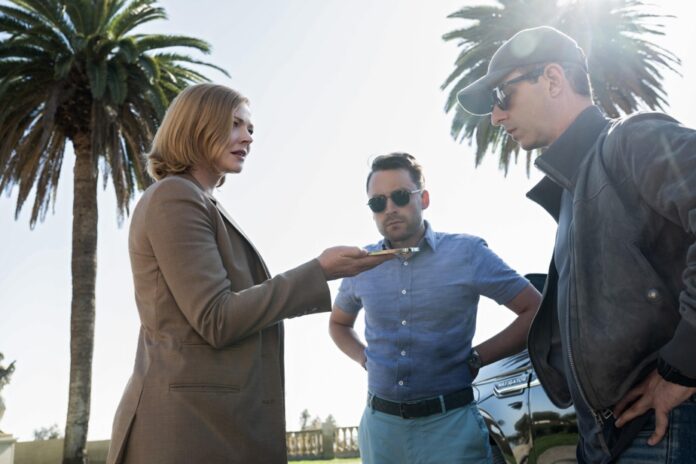The finale of Succession will not only mark the culmination of the internal wars of the Roy clan. It could signal the end of a pivotal period in television, referred to as the “peak TV” era.
This theory was recently the subject of an article in the Financial Times1. And everything indicates that it holds the road, confirm us actors and observers of the industry.
But before going any further, let’s clarify the meaning and origin of the expression “peak TV”, which could be translated into French as “overabundance TV”. It comes from the American John Landgraf, big boss of the FX network, who concocted it in 2015 to describe the almost overwhelming number of scripted content available to the public, when Netflix began its irresistible push, alongside platforms like Prime Video and Hulu. In other words, it’s a formula used to describe “an unprecedented period in terms of the number of fiction series produced annually”, summarizes Stéfany Boisvert, professor at the School of Media at the University of Quebec to Montreal.
When Landgraf first uttered the term, several video-on-demand services had yet to hatch, like Disney, HBO Max, Apple TV, and Peacock. Little did he know that the “peak TV” era was far from having reached its true “peak” and would drag on for several years. Apart from a slight decline in 2020 due to a certain global pandemic, growth has remained strong. Last year, no less than 599 fiction series emerged, according to Variety. Yet another record.
Barring a twist worthy of a District 31 season finale, that peak will not be matched this year. According to a report by Ampere Analytics examining the “cold war” of streaming giants in the United States published last March, investments by American platforms “have started to plateau”.
Could a high-profile series like Succession, which portrays a family as wealthy as it is dysfunctional, be born in such a context? Nothing is less certain, especially when we take a look at the headlines of the last few months: massive layoffs at Disney and HBO Max, subscription drops, series cancellations, etc. Because it takes a lot, a lot of money to film all those helicopter rides, summit meetings and social gatherings that make up the daily lives of Logan, Kendall, Shiv, Roman and company, it’s easy to imagine a broadcaster rejecting such an ambitious production. . When Crave relays the finale of Succession on May 28, we can consider ourselves lucky that the work created by Jesse Armstrong received the green light from HBO in 2017, when everyone was spending lavishly.
Other data from Ampere Analytics confirms the slowdown seen in the land of Uncle Sam. In January and February, the number of show orders for US audiences had fallen by 24% compared to the same interval in 2022.
According to Professor Stéfany Boisvert, the average viewer will not necessarily feel this decline, since in any case, there are not enough hours in a day to consume all the hours of available content.
But beware. The sluggishness of the global economy, combined with the concern for the profitability of the platforms, risks having a perverse effect. The diversity of series could be threatened. “The giants could favor consensual series that rally a large audience,” says Stéfany Boisvert. It can harm the series of authors. It can also hurt series like Succession, which take time to get good ratings. Companies could be tempted to quickly cancel works that could become significant. »
The end of the “peak TV” era is also affecting Quebec, says Nicola Merola, president of Pixcom, the box behind Indéfendable and Alertes.
“For the past few years, Bell Media has been investing in fiction. Radio-Canada and TVA continue to do so, like Tou.tv and Club illico. There were orders like never before. It is not something that can last, because there is not enough money in our ecosystem. »
In addition, Nicola Merola observes a “contraction” of the audiovisual sector in Quebec recently.
At Bell Media, owner of Noovo and Crave, we deny this decline. “Currently, we are expanding,” says Sophie Parizeau, general manager of fiction for the media group. We have no intention of slowing down. »
According to Nicola Merola, the Quebec community should favor co-production to continue to offer a large volume of series. “In the United States, the number of channels that can no longer afford to fund series alone is increasing. They need international partners. »
Pixcom was also inspired by a similar model to resuscitate Nuit blanche, which Radio-Canada had disconnected after a single season. The series will have a sequel on Prime Video and Series, which have joined forces for the occasion. “Series could never have financed this series on its own”, sums up Nicola Merola.
Bell Media has also recently announced the start of a series on Leonard Cohen, a Canada-Norway-Greece co-production.















